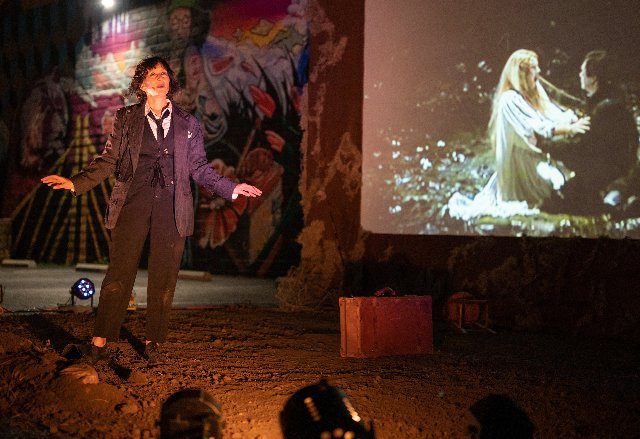Lisa Ramirez Performs Eliot's The Waste Land
April is the Cruelest Month
By: Victor Cordell - Apr 13, 2021
“April is the cruelest month…..” This famous line opens T. S. Eliot’s “The Waste Land,” generally regarded as one of the finest pieces of modern literature. At its best, this 434-line epic poem oozes symbolism and begs never-ending analysis of its trenchant insights. Yet, like its opening line, “The Waste Land” contains endless contradictions and ambiguities. Indeed, Eliot provided lengthy annotations of the poem in its original publication, though some of those confuse rather than illuminate. Detractors would submit that his episodic narrative with leaps in time, and changes in speakers and narrative style lacks cohesion. But perhaps that reflected the way he saw the new world around him. Further, Eliot’s frequent allusions to other literary works and use of untranslated foreign languages may seem to impress rather than inform.
John Wilkens has adapted “The Waste Land” to the stage as a vehicle for a solo performer. Oakland Theater Project has produced the staging, starring the multi-talented Lisa Ramirez and directed by Michael Socrates Moran. This production is the first live performance with a live audience sanctioned by Actors Equity in the state of California since the start of the pandemic. But to accomplish the approval, the performance is outdoors, and the audience remain in their cars. The good news with this arrangement is that the cars are parked one-deep, so that sight lines are great and the audience is close to the performer. The audio comes through FM on the car radio. The bad news, for the company, is that audience size is seriously limited.
Because the poem tells stories in different voices and perspectives, it is conducive to dramatic staging. For those who wish to expand their intellectual horizons but can’t muster the motivation to read Eliot’s masterpiece, Ramirez’s recitation with impressive interpretive movement, and variation of voicing, affect, and intensity captures the viewer’s attention in a manner that few readers would self-engender. And the performance offers an admirable dose of high-brow culture in well under an hour. As a fine actor, Ramirez does emote effectively, although her voice is not long on the gravitas often associated with poetry reading.
This production offers the added stimulation of projected images to enhance the lyrics and acting. A video preface to the live performance of brief clips covers the history from when the poem was written to current day – a reminiscence of iconic snippets embracing everything from pop culture to war, while videos within the body of the play largely support the text. In the absence of a printed program, I am unable to credit the creator. Few props appear on the earthen parking-lot “stage.” One used to pleasant effect is a strummed mandolin, which accompanies Ramirez as she delivers the words of the blind, Greek prophet, Tiresias, in a manner akin to an opera recitative. The overall impact of the production is provocative and engaging.
The poet doesn’t refer explicitly to a waste land, so what is the poem about? The dominant received wisdom is that it concerns loss. Published in 1922, American-born Eliot had lived for a decade in England, which had just suffered through World War I, and concurrently, the (inappropriately named!) Spanish Flu epidemic. Sensing that the massive loss of life and destruction of property had permanently displaced pre-war society, Eliot foresaw a bleak future. The poem is written in five distinct sections. The first, “The Burial of the Dead” establishes the overriding motif, and the speaker, Marie, evidences loss of station and things when she leaves childhood behind. The most direct reference to the uncertainty ahead appears in the final section, “What the Thunder Said,” with an expressed reference to the nursery rhyme “London Bridge is Falling Down” providing the analogy to failed civilization.
“The Waste Land” particularly resonates as a corollary to our time. The impact of Covid-19 in the United States now approaches that of the Spanish Flu, though worldwide, the latter was 15 times more deadly than Covid-19 has been to date. And while a devastating military war loomed in Eliot’s consciousness, this country now faces a cultural war that increasingly cleaves us into two disparate camps with little common ground between us, and in which, tragically, a large segment of the population representing one of those camps even refuses to accept empirical facts that disconfirm what they wish to believe.
“The Waste Land” is written by T. S. Eliot, adapted by John Wilkens, and produced by Oakland Theater Project. It plays in live performance drive-in theater format at the company’s home, Flax art + design, 1501 Martin Luther King, Jr. Parkway, Oakland, CA through May 16, 2021.
Courtesy of Cordell Reports.com


